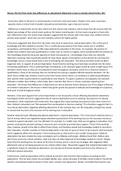Discuss the fact that social class di erences in educa onal a ainment is due to outside school factors [35]
Social class refers to divisions in society based on economic and social status. People in the same social class
typically share a similar level of wealth, educa onal achievement, type of job and income.
Di erences in a ainment can be seen within the free school meal indicator, which shows that the schools with the
highest percentage of free school meals produce the lowest overall grades. As free meals are given to those who
can’t a ord their own, the school meal indicator suggests that the schools with more lower class children tend to
achieve lower grades- those who are more wealthy achieve the higher grades.
It has been suggested that those from the lower class tend to experience cultural depriva on. This is the lack of
knowledge and skills needed to succeed. This is usually because parents from lower classes are in unskilled
occupa ons, and therefore there is li le value a ached to educa on in the home. For example, the parents of
middle class children may have quali ca ons in areas such as science or English, which would bene t the children as
this knowledge would be discussed regularly at home and passed on. Contras ngly, those who are culturally
deprived in working class households would not have these regular conversa ons as the parents do not have this
knowledge, and as a result would have a lack of skills going into educa on. This theory has been shown by Barry
Sugarman who, in support of cultural depriva on, found that the working class have been socialised into the value
immediate gra ca on. This is wan ng things immediately, so for example wages would be spent straight away. This
therefore means that, as they are not prepared to work throughout secondary school for no nancial reward or
quali ca ons, those of the working class are socialised into having a nega ve a tude towards educa on. On the
other hand, middle class children tend to come from homes where there is an emphasis on deferred gra ca on;
their parents have usually waited for quali ca ons and rewards. This gives a pa ence and arguably more posi ve
a tude to middle class children, which helps them maintain their focus in school, posi vely impac ng their
educa on. This shows that di erences in a ainment are due to external factors because one of the largest in uences
on children’s educa on is the house in which they grow up and the passed on a tude and knowledge on of parents,
both prior to and throughout school.
However, it has been argued that cultural depriva on is not necessarily a factor a ec ng educa onal a ainment.
Sociologists Ana n and Lynch suggest the idea of cultural depriva on (such as working class parents not valuing
educa on) is both misplaced and misdirected; they argued that many working class parents took a keen interest in
their children’s educa on, but “felt excluded from par cipa on in decision-making”. This therefore suggests that it is
not cultural depriva on nega vely a ec ng a ainment of the working class, but the inequality amongst the classes
in schools that has led to the exclusion of the working class in educa on.
Another external factor a ec ng educa onal a ainment is material depriva on. This is the lack of materials due to a
lack of money, which can nega vely impact educa on (par cularly of the working class) as the necessary resources
needed to support educa on can’t be a orded. For example, if a middle class child was struggling in educa on, their
parents could pay for private tutoring or resources such as books to provide extra support. Those of the working
class, however, would not be able to a ord these things, and therefore would lack knowledge needed to succeed in
their educa on. Another example of material depriva on is the lack of space at home to do research and homework,
which nega vely a ects the educa on of the working class as they tend to have smaller living spaces. Material
depriva on has been studied by many sociologists such as Wikeley and Horgan. Wikeley found that children who
don’t have access too school ac vi es, clubs and trips are o en deprived of knowledge needed for school. Horgan
found that the working class are aware of this lack of money, and as a result use strategies that nega vely a ect
a ainment such as not being present on non-school uniform days. These both suggest that material depriva on has
a signi cant impact on educa onal a ainment, not only due to nancial situa ons but due to the in uence on
a tudes towards educa on.
Furthermore, material depriva on will be no ced by teachers who will then label students according to their
appearance. This has been shown by sociologist Becker who, using interviews of 60 high school students, found that
teachers stereotyped students based on their work, conduct and appearance. Becker concluded that teachers saw




